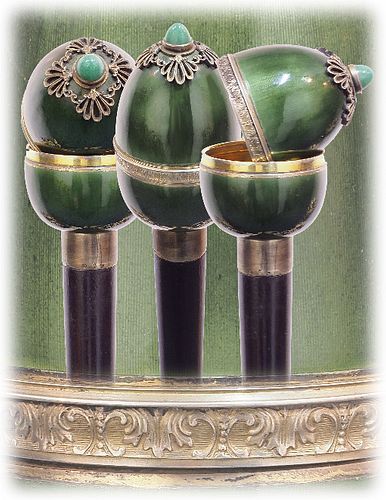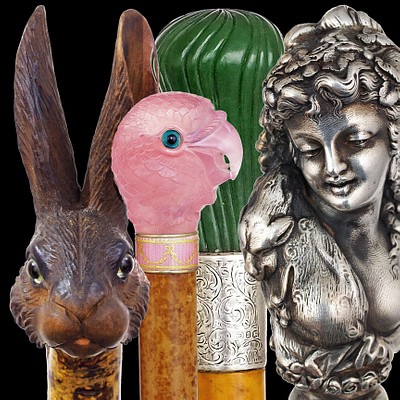Silver Gilt and Jeweled Enamel Cane
Lot 8
About Seller
Kimball Sterling
125 West Market Street
Johnson City, TN 37604
United States
Family-owned and family-run Johnson City Tennessee auction business for 25 years. Selling antiques and collectables for 38 years. Kimball M. Sterling, Inc. was founded and is owned by Kimball and Victoria Sterling, time and again, they have laid solid claim to world-wide attention and renown with an...Read more
Categories
About Auction
By Kimball Sterling
Feb 22, 2023 - Mar 12, 2023
Set Reminder
2023-02-22 00:00:00
2023-03-12 00:00:00
America/New_York
Bidsquare
Bidsquare : Passed Cane Auction
https://www.bidsquare.com/auctions/kimball-sterling/passed-cane-auction-12307
Selection of fine canes
Kimball Sterling kimballsterling@earthlink.net- Lot Description
-Ca. 1920 -Large silver gilt egg shaped container knob totally burnished and translucent deep green enameled. While the breaking line in the center of the egg is concealed under an encircling wider band precisely hand chased with trailing scrolls, the detaching top is embellished by a round shield consisting of four identical filigree sprays, joining with a centering aventurine, sugar loaf, cabochon. -Russian inspired taste and lavish luxury are apparent on the profile of this knob, whereas the enameling “en plein” technique and “S.N” maker’s mark on the collar, tentatively identified for Salomon Nass Viennese gold and silversmith, signal an Austrian identity. The adjacent “800” hallmark indicates that the knob was predestined for export and not for the local market. Well-streaked and richly hued rosewood shaft and a horn ferrule. -While canes all function on a practical level, this particular one was designed to instill a sense of luxury and indulgence. It is emblematic of the refinement and wealth of the Imperial days, and, a singular item of its kind, it was possibly commissioned to surprise. Be it a container for mini Easter Eggs or for a ring to the beloved lady, we leave it to personal imagination when it comes to how and with what. -Despite a great fragility, the cane survived in mint and flawless condition, possibly forever treasured in a protective cabinet, with a natural patina to the outside surface of the knob and the entire fire of the gilding on the inside. -H. 4 ½” x 2 ¼”, O.L. 39 ¾” -$1,500-$2,500 -Eggs embodies the idea of rebirth and rejuvenation in the cycle of life, reflected also in their shape, with neither beginning nor end. Christianity adopted eggs as a symbol of fertility, resurrection, and eternal life. From the outside, eggs appear stone cold, yet inside they nurture young life. Just as a grave keeps life locked in, eggs stood for the tomb in Jerusalem, from which Christ rose from death “like a bird hatching from an egg”. Consequently, eggs are an inherent part of Christian Easter celebrations. In one of Jesus parables, he calls the egg a good gift, hence eggs were regarded as “virtuous food”.
- Shipping Info
-
Each auction has different shipping terms but the buyer always pays.
Canes:
After payment has been received we will contact you.
-
- Buyer's Premium



 EUR
EUR CAD
CAD AUD
AUD GBP
GBP MXN
MXN HKD
HKD CNY
CNY MYR
MYR SEK
SEK SGD
SGD CHF
CHF THB
THB



















